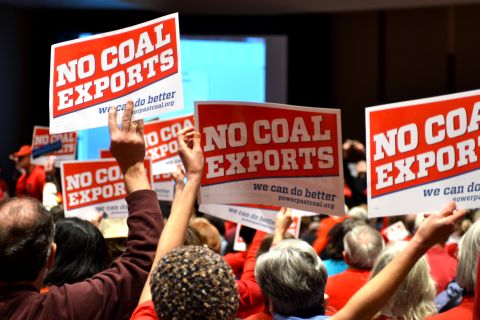Grassroots leaders just won a major victory for public health and the climate. The last surviving coal export terminal proposed in the Northwest was denied a permit by the state, spelling the end for the project. On Tuesday the Washington Department of Ecology denied a necessary water quality permit for the proposed Millennium Bulk Terminals coal export facility in Longview, citing the project’s negative impacts on climate, clean air, and water. This renders the project formally dead!
If you needed a reminder that people power can defeat polluters with big money, have I got a story for you. This project was one of six coal export terminals proposed in the Northwest over the past decade, as coal mining companies promised big markets in Asia were hungry for coal mined in Montana and Wyoming. Over seven years, a massive grassroots movement of over 1 million people, including Tribal Nations and dozens of organizations, opposed and defeated the projects. This was the last one standing.
If built, Millennium would have been the largest coal export facility in North America, sending up to 44 million tons of Powder River and Uinta Basin coal per year to Asian markets that are quickly turning away from coal-fired power. But thousands upon thousands of people across Washington and along the path of those coal trains organized, spoke out at public hearings, called, sent letters, rallied, met with elected officials, and did so much more over the past seven years.
From my colleague Cesia Kearns: “Over one million people in the Pacific Northwest formally commented to say we can do better than fossil fuels, and thousands of impacted community members have shown up at hearings to speak to how they would be harmed. This is a victory for everyone who would have been caught in the destructive path of coal exports, but also those who are suffering the real impacts of climate change.”
Over the years, I had the great privilege of joining local leaders in the Northwest to stand up against these projects. Back in 2013, I spoke at a hearing and press conference in Tacoma to oppose this very proposal, the Millennium project in Longview. And in 2016, I had the profound honor of speaking alongside leaders from nine Tribal Nations at a press conference to oppose the Cherry Point project, which threatened the treaty-protected fishing grounds of the Lummi Nation. Every time I joined these advocates, I was awed by their numbers, their passion, and their commitment.
We were staring down six massive coal projects that would have been a catastrophe for our climate, health, and environment, backed by well-connected developers with deep pockets who were working in cahoots with the likes of Peabody Coal and some of the most powerful interests on the planet. The odds were stacked against us. But over the course of seven years, dozens of hearings, and one decision point after another, local leaders never gave up.
Finally this week, the people won! Those 1+ million people know the risks of air, water, and climate pollution and they took a stand. The state’s own analysis found that the climate and air pollution from this project would be equivalent to adding 8 million cars to the road!
And this victory was the latest in a trend of grassroots activism stopping coal projects in the Pacific Northwest. From Cherry Point and Grays Harbor in Washington, to Coos Bay and Port of Morrow in Oregon, communities are saying no to coal and yes to a clean energy future.
No community -- in America or the world -- should face an energy source that sickens its children, dirties its rivers, and darkens its skies. Our movement is truly international, and stopping the export of coal helps both our country and the world fight pollution and climate change. The promised international markets for this coal are drying up, as countries like China reduce their use of coal and double down on clean energy. The defeat of this project is one more big step on the clean energy path.
“With every single coal export proposal in the Northwest denied or abandoned, we hope Northwest community leaders can now turn our attention to cultivating sustainable economic opportunities with good union, family wage jobs that keep our communities safe, healthy, and thriving instead of the boom and bust of dangerous fossil fuels,” said Cesia.
We still have some work left to do. Our neighbors to the North in Canada may see a proposed expansion of an existing terminal in British Columbia, and many people already live with the impacts of mining and shipping coal across the country. We will do our best to continue defending communities anywhere that are affected by coal pollution and seeking better solutions.
Clean energy is the way to power the Pacific Northwest and the rest of the U.S. Trump may continue to make empty promises of a coal comeback, but this victory underscores the reality that the decisions that matter are being made in the states, and our nation and the world are continuing to move away from coal to clean energy. Meanwhile, wind and solar power don’t pollute the air or water and bring with them an economic boost and good jobs. Help us continue to transition away from coal to clean energy - join us!
